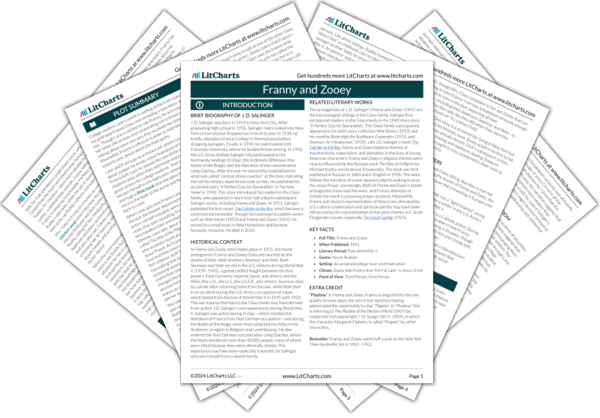Franny and Zooey initially casts egotism—or, in this case, the desire to be liked and praised—in a negative light. The first half of the narrative implies that the need to be liked or respected ends up forcing people to conform to various societal expectations that keep them from living authentically. Eventually, however, the narrative highlights the beneficial aspects of having a strong sense of self, ultimately suggesting that cultivating a certain kind of ego can help people avoid succumbing to soul-crushing conformity.
The book’s complicated treatment of conformity and ego is perhaps clearest in its characterization of Franny Glass, an idealistic college student. Though Franny loves the theater and acts well, she quits her college’s theater department because she fears that her egotism—her desire for others to like and praise her—will lead her to lower her artistic standards and accept bad theater as good. Franny becomes increasingly fearful that her attempts to live a more authentic, artistic, spiritual life are fundamentally egotistical and, as a result, she has a nervous breakdown and returns to her family’s dilapidated Manhattan apartment to recover. There, her older brother Zooey—also a talented actor—tries to persuade her that egotism isn’t really the problem: he argues that deadly social conformity occurs when people give up their “true egos,” which include their individual artistic impulses and standards, to please others. Instead, Zooey argues, people (and especially artists) should cling to their own high individual standards. Paradoxically, then, it is only through clinging to high individual standards that artists can selflessly share their talents with their audiences. Zooey’s argument, which comes near the book’s climax, suggests that conformity is deadly when it comes to developing an authentic self or artistic talent, but he also argues that ego—correctly understood as a strong sense of self and a commitment to one’s values—can foster authenticity, creation, and even selflessness.
Ego and Conformity ThemeTracker

Ego and Conformity Quotes in Franny and Zooey
Lane himself lit a cigarette as the train pulled in. Then, like so many people, who, perhaps, ought to be issued only a very probational pass to meet trains, he tried to empty his face of all expression that might quite simply, perhaps even beautifully, reveal how he felt about the arriving person.
“I think the emphasis I put on why he was so neurotically attracted to the mot juste wasn’t too bad. I mean in light of what we know today. Not just psychoanalysis and all that crap, but certainly to a certain extent.”
“If you’re a poet, you do something beautiful. I mean you’re supposed to leave something beautiful after you get off the page and everything. The ones you’re talking about don’t leave a single, solitary thing beautiful.”
After a moment, she picked up the book, raised it chest-high, and pressed it to her—firmly, and quite briefly. Then she put it back into the handbag, stood up, and came out of the enclosure.
“And the worst part is, if you go bohemian or something crazy like that, you’re conforming just as much as everybody else, only in a different way.”
“I’m not afraid to compete. It’s just the opposite. Don’t you see that? I’m afraid I will compete—that’s what scares me. That’s why I quit the Theatre Department. Just because I’m so horribly conditioned to accept everybody else’s values, and just because I like applause and people to rave about me, doesn’t make it right.”
“But the thing is, the marvellous thing is, when you first start doing it, you don’t even have to have faith in what you’re doing. I mean even if you’re terribly embarrassed about the whole thing, it’s perfectly all right. I mean you’re not insulting anybody or anything. In other words, no one asks you to believe a single thing when you first start out.”
I can’t help thinking that you’d make a damn site better-adjusted actor if Seymour and I hadn’t thrown in the Upanishads and the Diamond Sutra and Eckhart and all our other old loves with the rest of your recommended home reading when you were small.
“You can’t live in the world with such strong likes and dislikes[.]”
“Those two bastards got us nice and early and made us into freaks with freakish standards, that’s all. We’re the Tattooed Lady, and we’re never going to have a minute’s peace, the rest of our lives, till everybody else is tattooed too.”
“You want your Emily, every time she has the urge to write a poem, to just sit down and say a prayer till her nasty, egotistical urge goes away? No, of course you don’t!”
“There isn’t anyone out there who isn’t Seymour’s Fat Lady. […] And don’t you know—listen to me, now—don’t you know who that Fat Lady really is? . . . Ah, buddy. Ah, buddy. It’s Christ Himself.”











